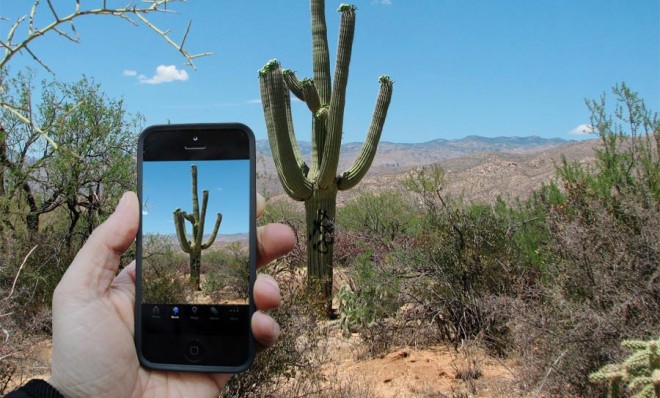6 things social media is ruining
If only the consequences of our addiction to status updates stopped at narcissism


A free daily email with the biggest news stories of the day – and the best features from TheWeek.com
You are now subscribed
Your newsletter sign-up was successful
1. Our national parks
If you tag a tree with spray paint in the middle of the forest and no one is there to Instagram it, will anyone know how cool you are? Such is the existential question likely being asked by the disrespectful graffiti "artists" who would dare to cover our national parks' majestic scenery with black spray paint. Rangers at Saguaro National Park in Arizona initially noticed such out-of-place markings on one of their towering cacti and red-rock buttes before doing a full surveillance of the grounds. They later identified at least 45 graffiti tags. Over the past year, the level of graffiti at Saguaro and Joshua Tree, among other national parks, has only escalated. Rangers say its the instantaneous nature of social media that encourages the impulse to deface. "In the old days, people would paint something on a rock — it wouldn't be till someone else came along that... anybody would know about it," a Joshua Tree spokeswoman tells The New York Times. But not anymore. A swipe and few clicks on your iPhone and — boom! — hundreds or thousands of Twitter, Facebook, and Instagram followers from all over the world can soak in your complete disrespect for Mother Nature.
2. Our marriages
The Week
Escape your echo chamber. Get the facts behind the news, plus analysis from multiple perspectives.

Sign up for The Week's Free Newsletters
From our morning news briefing to a weekly Good News Newsletter, get the best of The Week delivered directly to your inbox.
From our morning news briefing to a weekly Good News Newsletter, get the best of The Week delivered directly to your inbox.
While overall divorce rates have declined in recent years (yay!), more baby boomers are separating now than ever before (boo). The culprit? You guessed it: Social media. Before Facebook, if a wistful sexagenarian wanted to get in touch with the girl-who-got-away he'd have to pick up the phone and start a tree of contacts. He might even have had to get in the car and make a few house calls. But now, Grandpa simply logs into the Facebook page his grandson helped him set up to find that one-time pretty-young-thing posting faded old photos of their shared adolescence. More than 80 percent of divorce attorneys said that in the past few years they have seen "an increase in the number of cases using social networking evidence." These baby boomers may not intend to have physical or emotional relationships outside their marriage, but the siren's call of nostalgia can be a hard one to ignore with such easy online access.
3. Our minds
Our brains are malleable organs. In the last decade, as our mode of digital communication has grown shorter and quicker, our brains have been adjusting to our fast-paced speed of life. But not in a good way. Those 140-character tweets and 6-second Vines are wreaking havoc on our attention spans, which, 10 years ago averaged about 12 minutes. Today? 5 seconds. But there is more at stake than not being able to sit through a 2-minute cat video. At the least, our limited attention spans have caused us to be more forgetful — nearly one in 10 people have admitted to forgetting their own birthdays — as well as being less productive. And these effects may become difficult to reverse, as studies have shown that visiting and using social media sites triggers the release of certain hormones in the body, such as adrenaline, which is addictive.
4. Our writing skills
A free daily email with the biggest news stories of the day – and the best features from TheWeek.com
Younger generations that spend their formative years attached to smartphones and social media appear to be losing their ability to form complete sentences. The reliance on text speak and compressed language necessary for Twitter seems to be hard to break even in the face of, say, a passing grade. In Britain, high school teachers have encountered abbreviations, like "u" for "you" and "4" instead of "for," on exams, for God's sake. The degradation of language has gotten so bad that some of these schools have been forced to run remedial English classes to bring students up to a standard writing level. Essay skills "are going down the plug hole," a British historian and professor tells the Telegraph.
5. Our security
Posting your birthday on your Facebook page may instigate a torrent of shout outs on the big day, but sharing that kind of personal information may also be making you vulnerable to identity fraud. In 2011, identity fraud jumped by 13 percent, according to a recent report, and experts say it's all that TMI you're spilling all willy nilly on social media. In 2011, more than 11.6 million adults became victims of identity fraud. And those who used accounts including LinkedIn, Google+, Twitter, and Facebook had the highest incidents of fraud. Think about it. What's your go-to password? For a large number of people, it's their birthday. If you're trying to get clever, it might be your pet or sibling's name. And there you are just offering that information up to the masses. Rein it in, people, because it's not just your "friends" who are taking note.
6. Our sexual health
Suddenly becoming BFFs with complete strangers on social media, is just as easy as reconnecting with old friends. A few flirty chats back-and-forth and, in this digital age, you're practically going steady. This lax online culture may be making people less inhibited when they actually meet in person leading to more casual hook ups and, experts surmise, an increase in sexually transmitted diseases. Yes, it seems like a stretch. But STDs are on the rise in some parts of the country, and among the young generation that most often uses social sites. In Florida, the Seminole County health department reported a 200 percent rise in syphilis in 2011. And the inflicted are getting younger and younger, according to medics. "They're using the social networks. They're not talking to their parents, and they're hooking up with people that they really don't know anything about," said one Florida specialist. To try to right the seemingly dire situation, the Seminole County health officials, at least, are setting up information sessions about STDs specifically targeted toward teenagers.
Sources: @Risk, Bloomberg, DailyMail, MediaBistro, The New York Times, SocialAppsHQ, Telegraph
Lauren Hansen produces The Week’s podcasts and videos and edits the photo blog, Captured. She also manages the production of the magazine's iPad app. A graduate of Kenyon College and Northwestern University, she previously worked at the BBC and Frontline. She knows a thing or two about pretty pictures and cute puppies, both of which she tweets about @mylaurenhansen.
-
 Is Andrew’s arrest the end for the monarchy?
Is Andrew’s arrest the end for the monarchy?Today's Big Question The King has distanced the Royal Family from his disgraced brother but a ‘fit of revolutionary disgust’ could still wipe them out
-
 Quiz of The Week: 14 – 20 February
Quiz of The Week: 14 – 20 FebruaryQuiz Have you been paying attention to The Week’s news?
-
 The Week Unwrapped: Do the Freemasons have too much sway in the police force?
The Week Unwrapped: Do the Freemasons have too much sway in the police force?Podcast Plus, what does the growing popularity of prediction markets mean for the future? And why are UK film and TV workers struggling?
